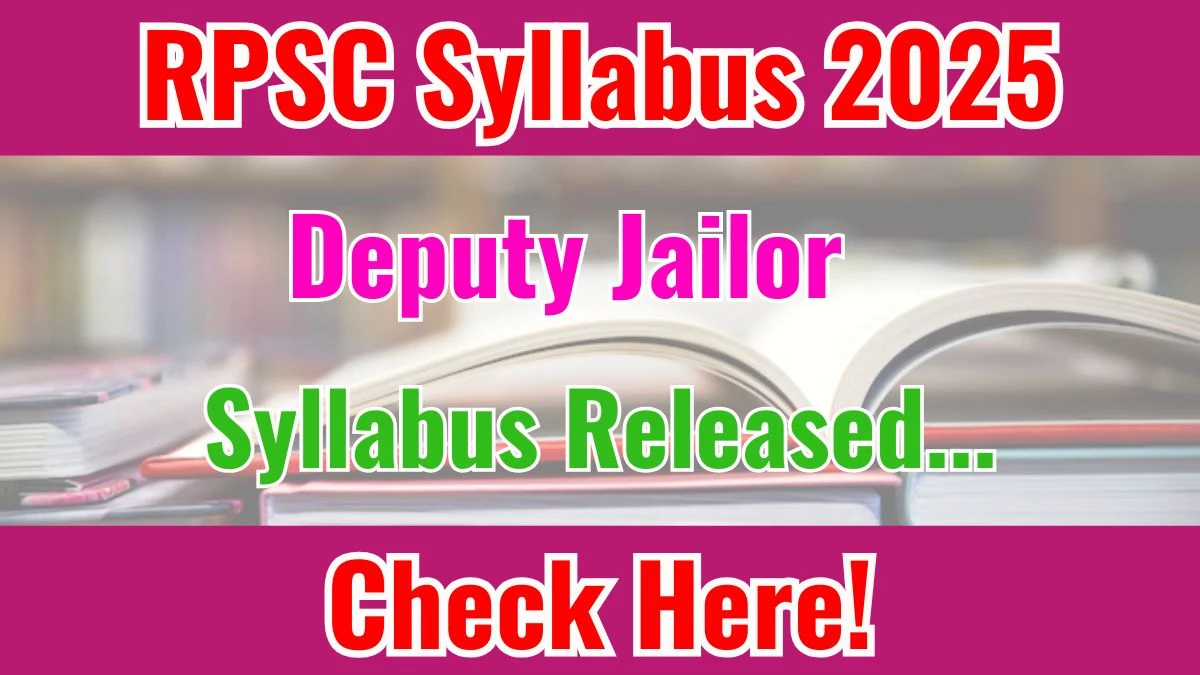RPSC Deputy Jailor Syllabus 2025 Overview
The Rajasthan Public Service Commission (RPSC) has published the official syllabus and exam pattern for the Deputy Jailor recruitment exam. To ensure a well-structured study plan, candidates aiming for the RPSC Deputy Jailor exam should thoroughly review both sections of the syllabus. Understanding the detailed syllabus and exam structure is essential for effective preparation.
| Conducting Authority | Rajasthan Public Service Commission (RPSC) |
| Post Name | Deputy Jailor |
| Number of Vacancies | 73 |
| Selection Process |
|
| No.of Questions | 300 |
| Duration | 3 hours (Per Paper) |
| Total Marks | 400 |
| Negative Marking | 1/3 Mark |
| Official Website | rpsc.rajasthan.gov.in |
RPSC Deputy Jailor Syllabus 2025
The syllabus is an important part of your exam preparation. It lists all the topics you need to study, helping you focus on what’s important. To do well in the RPSC Deputy Jailor exam 2025, make sure you understand the syllabus fully. It covers both general subjects and specific topics related to the post. Use the syllabus to guide your studies and ensure you're covering everything needed for the exam.
| Paper | Subjects | Topics |
|---|---|---|
| Paper 1 | Hindi | वर्ण विचार: स्वर और व्यंजन का वर्गीकरण शब्द भेद: विकारी (संज्ञा, सर्वनाम, विशेषण, क्रिया) एवं अविकारी (क्रिया विशेषण, संबंधबोधक, समुच्चयबोधक, विस्मयादिबोधक) शब्द भंडार: तत्सम, तद्भव, विदेशी शब्द शब्द निर्माण: संधि (स्वर और व्यंजन), उपसर्ग, प्रत्यय शब्द ज्ञान: पर्यायवाची, विलोम, अनेकार्थक, समश्रुत भिन्नार्थक शब्द-युग्म, वाक्यांश के लिए सार्थक शब्द व्याकरणिक कोटियाँ: लिंग, वचन, कारक, काल वाक्य: वाक्य प्रकार, शब्द एवं वाक्य शुद्धीकरण, विराम चिह्न मुहावरे और लोकोक्तियाँ पारिभाषिक शब्दावली: अंग्रेजी प्रशासनिक एवं विधिक शब्दों के हिंदी रूप कार्यालयी पत्राचार: आदेश, अनुस्मारक, विज्ञप्ति, अर्धशासकीय पत्र, निविदा, परिपत्र, अधिसूचना गद्यांश आधारित प्रश्न हिन्दी शब्दकोश ज्ञान एवं देवनागरी लिपि की मानक पहचान |
| Paper 2 | History, Art, Culture & Heritage of Rajasthan | Prehistoric to Iron Age sites Early historic centres (Malawa, Yodheya, etc.) Major dynasties & rulers (Guhila to Kachchawa) 19th–20th century awakenings, press & institutions Tribal, peasant, and Praja Mandal movements Integration of Rajasthan Architecture: temples, forts, palaces, water bodies Painting schools, handicrafts Music, instruments, folk dance & drama Language, folk & literary traditions Saints, sects, folk deities Social customs, fairs, festivals, attire, ornaments Renowned personalities |
| Ancient & Medieval India | Indus & Vedic civilizations, Buddhism & Jainism Dynasties: Maurya, Gupta, Chola, etc. Ancient literature: Sanskrit, Prakrit, Tamil Architecture & arts Delhi Sultanate & Vijayanagar achievements Mughal politics & culture Bhakti-Sufi movements |
|
| Modern India (19th Century–1964) | Rise of nationalism, western education Socio-religious reforms & leaders Freedom struggle: phases & major figures Post-independence events: reorganization, institutions, science-tech development |
|
| Geography of India | Physiography, climate, soil, vegetation Agriculture & major crops Industries: steel, textile, petrochemical, etc. Environmental issues |
|
| Geography of Rajasthan | Physiographic zones, rivers, lakes Climate, vegetation, agriculture, livestock Irrigation projects, minerals, population Industries & industrial development |
|
| Indian Constitution & Governance | Constitution: formation, features, amendments Preamble, Rights, Duties, Directive Principles Central institutions: President, PM, Parliament, SC Election Commission, NITI Aayog, federalism Issues: caste, class, religion, terrorism, etc. |
|
| Rajasthan’s Political & Administrative System | State leadership: Governor, CM, Assembly, HC Administration: Chief Secretary, District system Key institutions: RPSC, Lokayukta, SHRC, State EC, RTI Commission |
|
| Prison Reforms, Acts & Manuals | Committees: Pakwasa, Mulla, Krishna Iyer Prison Acts (1894–2023), Model Prison Manual 2016 |
|
| Economics (Basic Concepts) | Budget, Banking, GST, Public Finance, National Income Fiscal & Monetary policy Inflation: causes & control |
|
| Indian Economic Development & Planning | Sectors: Agriculture, Industry, Services Economic Reforms: LPG Major issues: Poverty, Unemployment, Food Security Central welfare schemes |
|
| Rajasthan Economy | Economic status, SDPs, PCI Agriculture & irrigation Industry development & policies Resources: land, livestock, water, minerals Infrastructure: transport, tourism, energy, finance Education, health, welfare schemes |
|
| Science, Technology & Environment | Daily science, computers, ICT Defence, space, nano, biotech, genetics Human health, food, nutrition Climate change, waste, biodiversity Rajasthan-specific agriculture & science initiatives |
|
| Reasoning & Mental Ability | Series, coding-decoding, blood relations Directions, calendars, clocks, ranking Math: real numbers, %, interest, profit-loss Time-work, mean, area & perimeter |
|
| Current Affairs | Rajasthan: schemes, policies, key persons/events, sports, Economic Survey National: policies, institutions, reforms, awards, security International: diplomacy, treaties, global events, organizations (UNO, WTO) |
Download RPSC Deputy Jailor Syllabus PDF
Aspirants can access the detailed RPSC Deputy Jailor Syllabus PDF to get a clear overview of all the topics essential for the exam.
Click Here - RPSC Deputy Jailor Syllabus PDF
RPSC Deputy Jailor Exam Preparation Tips
To prepare effectively for the RPSC Deputy Jailor exam, candidates should follow these commonly recommended preparation tips:
- Understand the Exam Pattern and Syllabus - Review the syllabus and exam pattern to plan effectively.
- Create a Study Schedule - Organize your study time for both General and Nursing subjects.
- Refer to the Best Study Materials - Use recommended books and resources for each subject.
- Practice Regularly - Solve practice papers and previous year’s questions to improve your skills.
- Focus on Conceptual Clarity - Focus on understanding core concepts, not just memorization.
- Improve Speed and Accuracy - Practice answering questions quickly and accurately.
- Stay Updated with Current Affairs - Read newspapers and follow online resources for current events.
- Maintain a Healthy Lifestyle - Eat well, stay hydrated, and take regular breaks.
- Revision is Key - Regularly revise topics to ensure better retention.
- Stay Positive and Motivated - Stay confident and motivated throughout your preparation.

